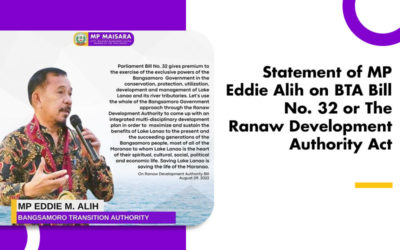The Inter-Cabinet Cluster Mechanism on Normalization (ICCMN) has approved the proposed Transitional Justice and Reconciliation (TJR) roadmap, a key component of the normalization track of the Comprehensive Agreement on the Bangsamoro (CAB), on Tuesday, March 30.
Government of the Philippines panel member and focal person for the sub-cluster on TJR, Office of the Presidential Adviser on the Peace Process (OPAPP) Assistant Secretary Wilben M. Mayor underscored that the TJR is considered “the heart of the [Bangsamoro] peace process.”
Mayor said that the TJR roadmap “is a living document that is intended to guide government programs and interventions on TJR and a set of deliverables that can realistically be started and achieved within the President Duterte administration.”
“This will demonstrate the government’s commitment in responding to the recommendations cited in the report of the Transitional Justice and Reconciliation Commission (TJRC),” he added.
The Normalization Program of the CAB provides for a comprehensive strategy to promote healing and reconciliation among communities in the Bangsamoro that have been affected by armed conflict.
An integral part of this approach was the establishment of TJRC in 2014 during the meeting held between the GPH and Moro Islamic Liberation Front (MILF) Peace Panels in Kuala Lumpur, Malaysia.
The Commission was mandated to undertake a study and recommend to the Panels the appropriate mechanisms to correct historical injustices and address legitimate grievances, human rights violation, and marginalization through land dispossession.
The ICCMN sub-cluster on TJR was created to formulate a roadmap that shall serve as a guide to carry out the recommendations made by the TJRC.
The ICCMN, as a whole, aims to discuss ways to further accelerate the implementation of the normalization track of the CAB.
In particular, the body was established to ensure the timely, appropriate, and efficient delivery of the Normalization Program through close collaboration and greater synergy among national line agencies.
Security aspect in full blast
Meanwhile, GPH Implementing Panel Chair and OPAPP Undersecretary David B. Diciano reported the milestones that have been achieved under the security component of the Normalization Program.
“We have already trained and constituted fifteen (15) Joint Peace and Security Teams (JPSTs) composed of 450 members from the Armed Forces of the Philippines, the Philippine National Police and the MILF’s Bangsamoro Islamic Armed Forces or BIAF,” Diciano said.
The JPSTs serve as peacekeeping forces in areas mutually agreed by the national government and the MILF.
“Out of the 15 teams trained, eight JPSTs have been deployed in mutually identified conflict-affected areas by the parties,” he added.
Since their creation, JPSTs have played a vital role in ensuring the security of the residents within the six government-acknowledged MILF camps during the second phase of the decommissioning process.
These teams will continue to perform their mandate until the Exit Agreement between the Government of the Philippines and the MILF is signed.
Diciano also highlighted the major accomplishments of the National Task Force for the disbandment of private armed groups (DPAGs), which include the disbanding of six private armed groups in Mindanao.
“The persistence of the NTF for DPAGs have yielded positive results with the disbanding of six PAGs in Western Mindanao in March 2021,” he said.
“With this, the NTF-DPAGs aim to strengthen its efforts and intensify the campaign of its Task Group. The NTF DPAG shall also endeavor to garner the pledge of commitment of partner LGUs to bolster initiatives against PAGs,” Diciano added.
Socioeconomic interventions
For his part, Joint Normalization Committee Co-chair Ariel Hernandez discussed the socioeconomic interventions to be provided to the decommissioned MILF combatants, their families and their communities.
These interventions include the provisions of social protection, capacity development, livelihood and employment, and infrastructure.
Under social protection, the MILF combatants were given immediate cash assistance right after their decommissioning. They were also provided with health coverage and civil registration.
Among the activities under capacity development are values transformation, Alternative Learning System, study grant program, and technical-vocational education training.
Read more: https://peace.gov.ph/…/inter-cabinet-body-on-normalization…/
Source: peace.gov.ph




